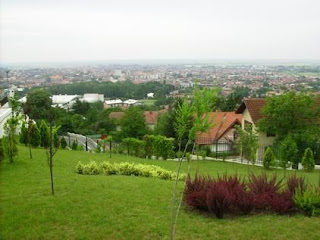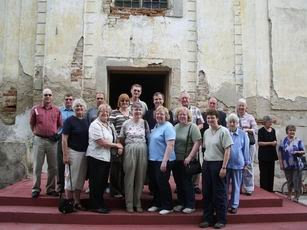The remaining eight of us were on a 5 pm flight. Since check out time at the hotel was noon, we thought we might as well go to the airport then and hang out there. It seemed like a good idea at the time, but we did not realize that Frankfurt airport is designed to undermine the German reputation for efficiency.
 In any other airport terminal I am familiar with, the chairs at the gates are open seating. Anyone can sit anywhere. But at Frankfurt, the seats at each gate are only available to passengers with boarding passes. And there are only a few chairs in the corridors. So hundreds of chairs sat empty behind locked gates while we wandered through the terminal with a few people seated, many of them with their carry on bags on adjacent chairs, others laying down taking up four or more chairs, and still others seated on the floor. We checked out a few stores, but mainly just wandered around waiting for our gate to open.
In any other airport terminal I am familiar with, the chairs at the gates are open seating. Anyone can sit anywhere. But at Frankfurt, the seats at each gate are only available to passengers with boarding passes. And there are only a few chairs in the corridors. So hundreds of chairs sat empty behind locked gates while we wandered through the terminal with a few people seated, many of them with their carry on bags on adjacent chairs, others laying down taking up four or more chairs, and still others seated on the floor. We checked out a few stores, but mainly just wandered around waiting for our gate to open.Finally, our gate opened and we got seats. Eventually, a young lady made the pre-boarding announcement, but she spoke so quickly and quietly and the acoustics were so bad, that you couldn't tell where the German ended and the English began. So, pretty much everybody jumped up and got into line when she asked for those requiring boarding assistance! Our rows were among the first ones she later called, but, by that time, there were only a couple of dozen people left seated, so we thought we might as well wait it out on chairs rather than standing up.
 Our flight departed at 5:15 pm. We landed Toronto at 12:40 am Frankfurt time/6:40 pm Toronto time. Diane left us there to catch her Vancouver flight. The remaining seven of us bound for Regina departed at 9:30 (Toronto time, 3:30 am Frankfurt time, 7:30 Regina time) and arrived Regina at 10:30 Regina time. Here is the remaining group of seven after arrival in Regina.
Our flight departed at 5:15 pm. We landed Toronto at 12:40 am Frankfurt time/6:40 pm Toronto time. Diane left us there to catch her Vancouver flight. The remaining seven of us bound for Regina departed at 9:30 (Toronto time, 3:30 am Frankfurt time, 7:30 Regina time) and arrived Regina at 10:30 Regina time. Here is the remaining group of seven after arrival in Regina.




















































